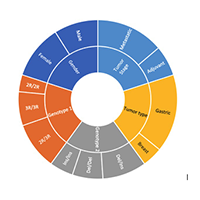Correlation between polymorphism of TYMS gene and toxicity response to treatment with 5-fluoruracil and capecitabine

Accepted: 13 May 2020
HTML: 10
All claims expressed in this article are solely those of the authors and do not necessarily represent those of their affiliated organizations, or those of the publisher, the editors and the reviewers. Any product that may be evaluated in this article or claim that may be made by its manufacturer is not guaranteed or endorsed by the publisher.
Authors
Tumorigenesis is a multiphasic process in which genetic alterations guide the progressive transformation in cancer cells1. In order to evaluate the possible correlation between some gene variants and the risk of the toxicity development onset, two of the polymorphisms of the thymidylate synthase (TYMS), rs34743033 (2R/3R) and rs16430 (DEL/INS) were investigated. We enrolled in our study 47 patients from the Hospital of Sicily. Our preliminary findings suggest that there could be a linkage between the genotypes discussed and the development of the toxicity following the chemotherapy treatment. These results need to be confirmed by further studies, however this short paper offers some initial insight into the relationships between genetic background and the better outcome for patients.
How to Cite
PAGEPress has chosen to apply the Creative Commons Attribution NonCommercial 4.0 International License (CC BY-NC 4.0) to all manuscripts to be published.

 https://doi.org/10.4081/ejtm.2020.8970
https://doi.org/10.4081/ejtm.2020.8970



